The Danger Of Chasing Cats Under Beds
If you have not seen the latest Hyperbole and a Half clip, here it is. It is about cats, and displays the cartoonist Allie Brosh’s wonderful mastery of computer-machine drawing and the use of music in storytelling. And her inventiveness. It’s pretty great.
Outside The Box: Seeing Who Saw Kanye West Last Night
by Nate Freeman
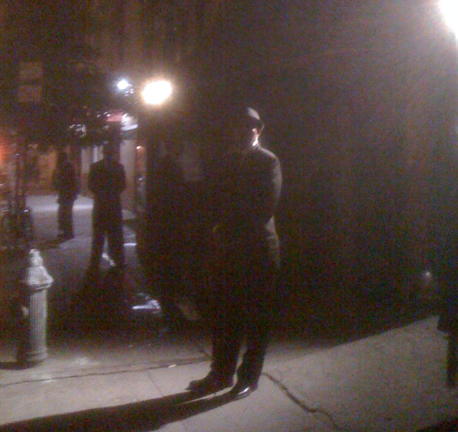
Like the vast majority of Americans, I did not get in to the secret dress-up Kanye West show at The Box last night. The stone-faced doormen were wrapped in dark suits and clutching umbrellas-the umbrellas that doubled as canes, swung toward the ground, whenever the intermittent drizzling receded. The door would open every minute or two, and you could hear echoed bits of sound. First you heard the thin remnants of the voice of Kanye West. Then, if the doorman lingered a bit longer, you could make out a beat, or a synth tone, and the song title would come immediately. Kanye doing “Get ‘Em High.” Kanye doing “American Boy” with Estelle. Or Kanye doing something brand new.
“No, no, no, no-not there, here,” the bouncer said as she gestured us away from the entrance to The Box, and toward the railing in front of Kush, the place adjacent to the Lower East Side faux-cabaret smut factory. It was 1:45 a.m.
Simon Hammerstein walked through his door. He’s the club’s owner, and heir to the theater family famous for an different kind of entertainment-I don’t remember the Von Trapp family engaging in any dildo acrobatics in “The Sound of Music.” He was wearing a French-cuffed shirt with three buttons undone-the rest were affixed with black studs. He had a pocket square at his left breast and parted his hair to the right. He kept his beard neat, and put his hand on my bouncer, who was dealing with a couple trying to get in.
Simon reiterated the bouncer’s denial. “I’m your boss,” he said, pointing at his man. Then he went inside.
I asked how the Kanye West was going.
“I don’t know nothing about this,” the bouncer said and directed me toward the front again, where a more senior member of the Box Security Team was pacing. By the rope was a girl who insisted she was on the list, and pecked at a Blackberry, trying to prove it. I approached one of the men.
So, like, Kanye, right? How is Simon dealing with all this extra craziness? “Love Lockdown” bled through the cracked door.
“I’m not at liberty to debate it right now,” he said, and shooed me back toward Kush. There, The Box people had corralled the smokers on the block-”the neighbors are sleeping”-whether or not they were at the show or not.
It was 2:45 a.m. “Let’s go to Kenmare!” someone said to his bros. Silence. “No? What’s the plan then?”
Another dude fist bumped the bouncer-”my man!”-as he has a cigarette with a girl. Another group had been at the Rihanna show at Madison Square Garden earlier. They weren’t exactly ecstatic about the Kanye’s performance.
“I thought Beyoncé was gonna show up!” one of them said.
“Jay-z did a show tonight uptown at-oh, what is it?-Radio City,” said another.
“That’s probably where Beyoncé is,” said the first. “Everyone thought she was gonna be here.”
More walking-talking pocket squares dragged their arm candy out the side door and hailed cabs. A girl standing by herself pouted and asked me which way to 1 Oak. I told her it’s not really a walking distance. She tried to get me into the cab with her but I declined.
By 3:30 a.m., the block was nearly cleared.
“You haven’t missed much,” one guy said, over a smoke, waiting for his crew to come out so they can head elsewhere. “Does anyone in there really care? It’s just another night at The Box.”
Tropical Fish Netted In New Jersey River, Man Suffering Existential Crisis Finds Hope For Future
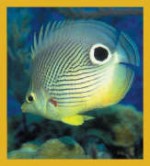
“Once the net was on the beach it was picking time. All sorts of bait jumped about. The majority of it was tiny green-tinted spearing. But the seine also netted grass shrimp, striped killies, a needle fish, one baby fluke and a tropical butterfly fish about the size of a quarter. Rarely do you see three people so fascinated by such a tiny specimen. Its golden green color glistened in the sunlight. ‘It probably came up through the intercoastal waterway,’ Figs suggested. The Manasquan River is the very northern end of the waterway that leads south to Florida. It could be that the little fish hitched a ride as larvae on a boat making the trip and hatched in the river. It’s anyone’s guess.”
–Three pages might be more than you want to read about casting nets for baitfish. But imagine pulling something that looked like that out of the water in New Jersey? It’d be like the brook trout in The Road. “On their backs were vermiculate patterns that were maps of the world in its becoming…” Wouldn’t it? A little bit, even? No? I think it would.
Their Eyes Were Watching Porn
by Jordan Carr

Considering that you are on the Internet right now, the odds are that, if you’re not in an open-plan office, either your previous or next visit will be to a porn site. And when you do so, you may do it in your browser’s “privacy mode,” in order to cover your digital footsteps. But maybe you should hold off for a minute on that. A very important new study explains that the authors “show that many popular browser extensions and plugins undermine the security of private browsing.” The long and the short of it? If you are on the internet looking at porn, you are not safe. And worse, the study details exactly what portion of you people in private browsing are looking at porn. With bar graphs. We spoke to an author of the study to get more vital information about porn safety.

(You can read the study, by Dan Boneh, Gaurav Aggarwal, Elie Burzstein, and Collin Jackson in this PDF.)
As it turns out, the only self-restraint Safari users know about is of an auto-erotic nature. The study strikes an appropriately sober tone in the results section:
We found that private browsing was more popular at adult web sites than at gift shopping sites and news sites, which shared a roughly equal level of private browsing use. This observation suggests that some browser vendors may be mischaracterizing the primary use of the feature when they describe it as a tool for buying surprise gifts.
And with that, the scientists christened “buying surprise gifts” as a euphemism for masturbation.
You may have some questions — serious questions couched in irony — about this study, and what it means for your completely unironic porning, and also, I guess, your secretive news browsing. But fret not!
I contacted Dr. Aggarwal, a man who can now call himself one of the world’s foremost experts on sneakily watching porn, and he was generous enough to write back to me about his study.
Dr. Aggarwal cited a few reasons why he undertook this study: “People are concerned about their data on various websites and whether their browsing activities are being tracked by websites. Private browsing is also marketed as a special browsing mode that provides privacy against ‘local’ attacker [i.e. somebody using your computer while you’re away from it, even though you like, totally told them not to, and they still did it anyway. Why doesn’t anybody listen to me? I can’t wait until I move out of the house and get my own place without mom and dad always going through my things!] and also to some degree against tracking websites.”
And so “we wanted to study private browsing, define its threat model and analyze how good it is at providing privacy.”
Should we be concerned about their revelations?
“The most alarming [security weaknesses] in my opinion are browser extensions [basically, plugins and add-ons]. Most of these extensions are oblivious of private mode and can store URLs of sites being visited on disk.”
Okay, so these things are inadequate now…but surely some day in the future, private browsing will be truly private, a vast wonderland where the vast, guiltless porn horizon stretches as far as the eye can see, right? Right??? Dr. Aggarwal???
“It is not possible to guarantee that no state would be saved on disk in private mode — all browsers fail in one way or the other,” he wrote.
Or not.
“We need a better browser architecture for handling extensions,” he wrote. “Browsers need to agree on the goals for private browsing that are consistent with user’s expectation and the way this mode is marketed.”
Great. Lower your expectations people, and know that someone on the internet could be watching you right now, but only if you’re important enough to them. So, from now on, when you get on the internet, just ask yourself: “Am I as important as Ben Quayle?”
Photo from the First Goatse Flickr pool by Scott Perry.
31 of BET Uncut's One-Hit Wonders (in Order of NSFW-Ness)
by Jeff Rosenthal
31. Lil Peedy’s Poppin N Lockin
30. Slowmotion Soundz’ Lacs & Prices feat. T.I.
29. Won G’s Caught Up In The Rapture (feat. Paris Hilton)
28. T da Pimp’s All These Girlz
27. Joey “Da” Y’s Dat Apple Bottom
26. White Boy’s Where The Party At
25. Mighty Casey’s White Girls
24. X-Con’s Whoa, Lil’ Mama feat. Jay & Twig
23. J Menace’s Ting Ting
22. J Knoxxx’s West Coast Party
21. Ward Boyz’ Slap It Clap It
20. The Firemen’s Azz Dance
19. CAB Life’s Roll Up
18. Joey Montana’s Caramelo
17. FlamBey’s Hot Girls (Remix)
16. Hustle Mania’s Bend Over
15. Filthy Rich’s Super Ho feat. Neesha
14. G-Nut’s Strip Club
13. Cold Cannons’ Shake It Like a Pitbull (feat. Deezy Slim)
12. Horizon’s Take it Off feat. The First Sonrize
https://www.youtube.com/watch?v=aTJrUbkXZhg
11. Ziggy Tha Don’s Shake It, Shake It/Who Gon’ Fuck You
10. Preacha’s Shake That Shiii
9. Nate Natale’s Mucho Humpty Hump feat. Money Car$in and B.A.
8. Isaiah’s Pleasure Paradise
7. DJ Slim’s Pussy Licker
6. Wax-a-Million’s No Panties on the Dance Floor
5. Twip’s Ass Drop
4. Black Jesus’ What That Thing Smell Like
3. J Shin’s Baby Mama Drama
2. The Team Uncut’s Time for Freakin’
1. Sha Dirty’s Ass Clap
Jeff Rosenthal works from home for ItsTheReal.com and @ItsTheReal, so NSFW doesn’t mean anything to him. Also, he’d like to say hi to his Mom if she’s reading this.
Writers That Complain Should Be Roundly Mocked, Beaten

So I took my first non-emergency day off yesterday from this blog, which is my “day job.” Holy mackerel. I went to some libraries and did research! I went to cafes-cafes that didn’t have wifi-and wrote! I took a nap in the middle of the day! So here is my mini-revelation. You know how you have writer friends who don’t have another job who are all, oh, my book, my book is due in four months, I have to write this boooook and are all torturey and tortured? Please laugh at them all the time.
Now, I’m sure one’s mileage will vary if people have to write a book that is funny (no one can be funny all the time) or historically illuminating (research is demanding, and making it breathe is probably hard!) and it’s probably really crazy to have to make up things for fiction that are interesting or sensical (not a word). And I’m sure it’s very hard to write a very good book. But most people don’t do that, and you can’t make yourself write a “good” book really, or else everyone would do it, so it’s not really an issue!
And, to be fair, long-term project management is stressful! And book-publishing is weird for authors because you get some money and then you get some money like 18 months later and then maybe some more money in another year, and so managing that financially is really eye-crossing.
But really, apart from that, which, you tell me: is that all worse or better than working in an office and filing your TPS reports?
So you get up in the morning and make some coffee and read some things that give you ideas and you take a shower and have some ideas and you jot down some notes and write a few chapters and then you break for a snack and then you write a few thousand words and then it’s only time for lunch.
What the hell, people? That’s not work! That’s like getting massaged on the lido deck of the Good Ship Unicorn while magical fairies feed you meringues.
Now, you’re totally allowed to sympathize with all book writers after their first book is published and no one wants to talk to them and they have nothing to do and, you know, have to get jobs blogging or teaching or whatever. Because that shit is a lot closer to being work. Though I imagine it still beats assembling walk-in refrigerators and doing oil changes or writing about celebrities.
The Secret Kanye West Show at The Box Last Night
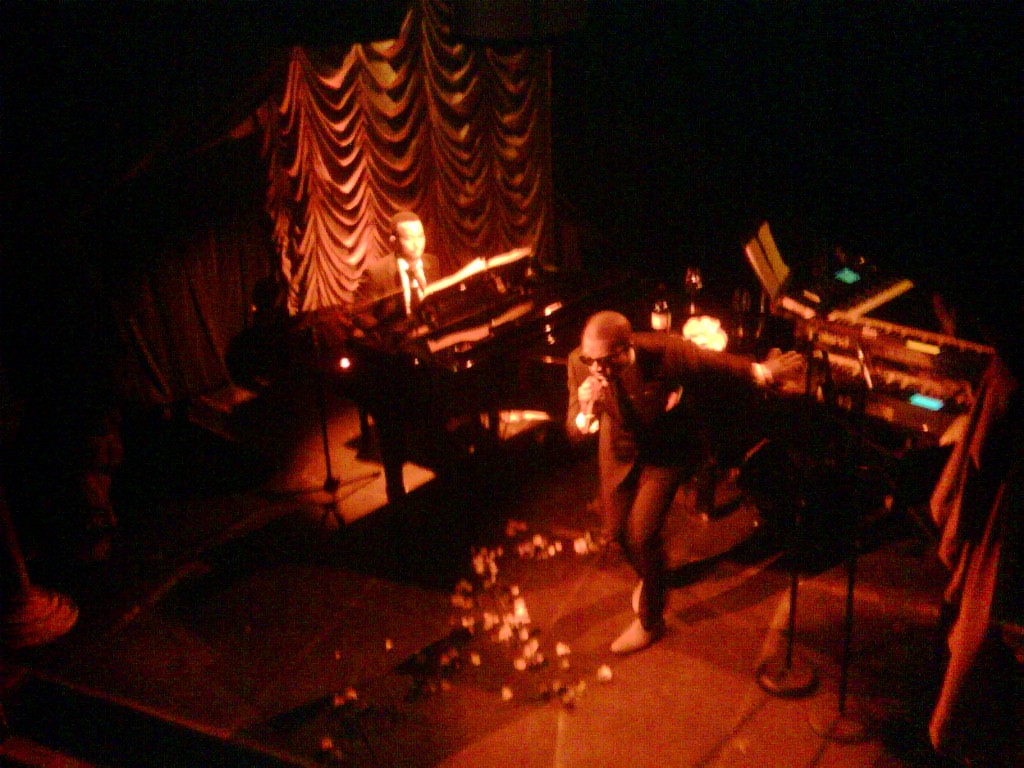
Sometime around when he joined Twitter, Kanye West started something called “The Rosewood Movement.” Before last night, this was widely accepted as just an excuse for Kanye and his friends to wear nice suits and to have a name for being all-around classy guys. As it turns out, the “Movement” is more than that. In a “secret” and private party at The Box last night, Kanye West and John Legend performed what they called the first in a series of intimate concerts. The only caveat for the attendees was that they all wear formal attire-specifically, that all the gentlemen in attendance wear suits and “hard bottoms,” more commonly known as dress shoes.
The happening of the secret concert seemed to actually be kept a pretty good secret as there were only a few people who tried to crash the door. Presumably if this were not the case, it would have been more of a madhouse, but whether it was the rain or the tight lips of those involved in the Rosewood Movement, the whole thing was not particularly overcrowded. That being said, there were a few people who weren’t on the list who tried to make their way inside. One particular social media technology founder and his party were originally denied at the door and then, after business cards were exchanged in a “Do you know who I am? I am this guy!” sort of way, a compromise was reached and two people from the party of five or six were allowed to enter.
Although the party was supposed to start at midnight, Kanye and his friends did not get there until around 1 a.m. Until that point it was unclear as to what was happening, whether it was just a party, whether there would actually be performances, or if a lot of people who weren’t used to wearing suits would have to continue standing around awkwardly wearing suits for an indefinite amount of time.
Around 1:30 a.m., Kanye finally took the stage. His labelmate and longtime friend John Legend was on a grand piano as an accompanist, and there was a third person who was behind several keyboards. The show itself started as a series of stripped down hits from Kanye’s repertoire, and the first quarter of the set was pretty mellow, as though the fact that everyone was wearing suits meant that things weren’t going to get particularly exciting.
After five or six songs, as he brought out Estelle for ‘American Boy,’ the energy level of the show hit another gear. Kanye started going through his more upbeat numbers including performances of the song he produced for Drake, ‘Find Your Love,’ and he also used a sample machine on stage to create new interpolations of his own hits like ‘Flashing Lights’ and a new song that samples the Billy Joel song ‘Movin’ Out (Anthony’s Song),’ which is about a boy who doesn’t like the new male companions of his newly divorced mother. It was very, very good, but it’s also hard to go wrong when using that chorus.
One of the highlights was a performance of ‘Say You Will’ off “808’s and Heartbreak,” in which he explained the inspiration for the song; that it was mostly to do with women who were indecisive in committing to sexual endeavors. Examples cited were girls who on a Friday night said they would come over to have sex but changed their mind at the last minute, leaving Kanye in a lurch. He was also not thrilled when girls would not send him sexts (dirty pictures via e-mail or MMS) when he was on the road. It sounds like a stupid complaint, but it was much more reasonable sounding the way he articulated it. It seemed like a very annoying problem to have!
What resonated through the whole show was how much fun Kanye was having. As the crowd was small, probably no bigger than 200 or so people, many of whom were personal friends of his, he was just playing music he was very proud of and enjoying the adoration and positive energy of the small room. Even as the planned set ended, he kept going through the MPC to find new songs he could do-and it should be noted that John Legend and the keyboardist were insanely impressive as they kept up with his ranting, changes to songs and random jamming out with his samples. At one point, Kanye started pounding on the keys so hard that at the end of the song he came out looking hazy, and he said he felt like a drummer who was on the first night of his tour and had just completed his first solo.
There were a few very minor missteps on the night. First was the fact that Mos Def was in the building, but not near the stage when their collaboration ‘Two Words’ was being performed, and so Kanye was looking around for the rapper to no avail. Next was the fact that the drink of choice, at least by the Rosewood Movement, was the creatively named “Rosewood.” It is: sauvignon blanc, cranberry juice and a simple syrup. You can guess how that tasted.
The dress code was pretty heavily enforced, but the only men who seemed to enter sans suit were David Beckham and his hanger-on buddy. Pulling the “It’s not really that cold and other people are actually sweating but I’m still going to wear a beanie” move, he was perched up in one of the upper booths with no Victoria Beckham in sight, though he did have some cute-ish British girls with him. To his credit nothing particularly salacious was happening with their party-and the background on his new Blackberry Torch was a picture of his family.
After the performance was over, Kanye and John Legend walked off the stage to join their friends who were there supporting the Rosewood Movement, including Pusha T of the Clipse, Big Sean, Mr. Hudson, longtime manager and friend Don C, Ibn Jasper and Virgil Abloh. After a little more lounging, the venue started to empty out. Kanye started towards the exit, through the crowd, and he went out of his way to thank people individually, friends and strangers alike, for coming to his show. He seemed genuinely very, very happy.
How Naomi Campbell Taught The World About War Crimes
“The big PR winner? The UN’s Special War Crimes Tribunal for Sierra Leone. As one of the UN staff told us, ’90 minutes on the witness stand by Naomi Campbell has given the issue of blood diamonds and the war crimes alleged against Charles Taylor more coverage worldwide than its had combined in the three years the trial has been underway.’”
-Publicist Neil Wallis explains how the media strategy designed for his client Naomi Campbell’s recent testimony at The Hague resulted in greater awareness for the war crimes tribunal itself.
Scientist Mars Important Discovery By Using Terrible Cliche
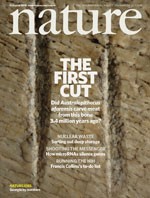
“This discovery dramatically shifts the known timeframe of a game-changing behavior for our ancestors. Tool use fundamentally altered the way our early ancestors interacted with nature, allowing them to eat new types of food and exploit new territories. It also led to tool making-a critical step in our evolutionary path that eventually enabled such advanced technologies as airplanes, MRI machines, and iPhones.”
–Dr. Zeresenay Alemseged, from the California Academy of Sciences, on the cut marks he and his team found in 3.4-million-year-old animal bones in Ethiopia. The discovery, reported in Nature magazine, is amazing; it pushes back the scientifically established estimate of earliest tool-usage by 900,000 years. But, God, can people stop saying “game-changing” so much?
Have Editors and Writers Always Hated Each Other?
by Jane Hu
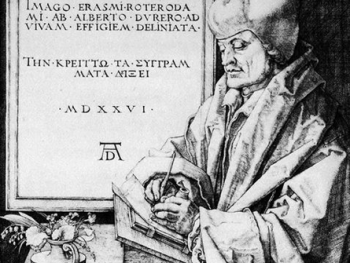
After publishing Richard Morgan’s account of his life as a freelance writer, we heard from someone who’d been both a freelance writer and an editor at a major newspaper. “Was there a time, a long time ago, when editors and writers weren’t at war with one another?” he asked. Although one would think a congenial relationship between the two would lead to clearer and more cohesive writing, writers and editors do indeed seem to be locked in perpetual conflict. How did we reach such levels of animosity? I looked to the historical record.
During the age of Chaucer, authorship was divided — in descending order of importance — into the role of author, commentator, compiler and scribe. Within this spectrum, a commentator was the closest to what we now consider an editor and, even then, his role was seen as secondary to the author. (Chaucer assumed all four positions, but c’mon, he was Chaucer.)
Due to the Gutenberg press and movable type, the 1470s showed a growing investment in establishing authoritative versions of ancient texts. Erasmus, the “quintessential European man of letters,” was heavily invested in print media and worked with the most important printers in Europe. With the aid of humanist scholars, who essentially acted as editors and correctors, he produced his landmark corrected version of the New Testament and the nine volumes of St. Jerome’s correspondences. Erasmus held a meticulous editorial standard and believed in getting recognition for his hard work. He was sorely against the self-effacement of the editor. Erasmus’s scrupulous revisions were not all to restore authorial intentions, but to allow the insertion of his own editorial voice. In regard to revising St. Jerome’s epistles, he noted:
I have slain with daggers the spurious or interpolated passages, while I have elucidated the obscure parts in my notes…. I believe that the writing of his books cost Jerome less effort than I spent in the restoring of them, and their birth meant fewer nightly vigils for him than their rebirth for me.
During Shakespeare’s time, the line between writer and editor was still not clearly defined. Although Shakespeare was, in a sense, very much his own editor, colleagues still helped to compile his folios. In 1725, Alexander Pope had used the term “stage-editors” to refer to play-alterers. For instance, Pope’s contemporaries would have viewed David Garrick as an editor of Shakespeare. In an advertisement to the third release of Garrick’s version of “Romeo and Juliet,” he identified himself as “the present editor.”
In his 1755 Dictionary, Samuel Johnson defines editor as a “Publisher: he that revises or prepares any work for publication.” We should note that “publish” then meant to “discover to mankind; to make generally and openly known; to proclaim: to divulge.” As such, the publisher had the critical right and obligation to expose information and truth to “mankind.”
The No. 457 paper (published August 14, 1712) of Joseph Addison’s “Spectator” describes “Editors, Commentators… Men of no Learning, or what is as bad, of no Knowledge.” In the No. 470 paper, printed a few weeks later, Addison bitterly writes his “disappoint[ment] of late Years, when upon examining the new Edition of a Classick Author.” Whereas Addison’s ideal editor discovers a “different Reading gives us a different Sense, or a new Elegance in an Author,” these editors of late apparently only gather “the various Blunders and Mistakes of twenty or thirty different Transcribers.”
The first mention of a newspaper-specific editor appears in Sir George Rose’s Diaries (1803), where he mentions a “Mr. Herriot, the Editor of the True Briton and the Sun.” Rose’s depiction of Mr. Herriot points to the profound influence of the public word-and the editor as publisher.
In regard to the English prime minister William Pitt the Younger’s soon-to-be second term in office, Mr. Herriot told Rose that although “he knew the esteem and respect of the country for Mr. Pitt was higher than ever…. he would not manifest to the world his opinion of the incapacity of Ministers, a paper that professed to support him and expose them could not stand.” Mr. Harriot’s reticence is understandable since Henry Addington’s (a supporter of Pitt) brother “assisted most materially in circulating his paper.”
Already, which opinions could be merely said and which could be printed in a newspaper were dependent on networks of political and financial alliances.
Animosity and skepticism against editors did not slacken. A few decades later, William Cobbett’s Rural Rides (1823) condemns English editors left and right: “The fast-sinking Old Times newspaper, its cat-and-dog opponent the New Times, the Courier, and the Whig-lawyer Tramper, called the Traveller; these fellow who conduct their vehicles; these wretched fellows, their very livers burning with envy….”
Cobbett’s rhetorically inventive insults continue: “Pray, can any one pretend to say that a spade or shovel would not become the hands of this blunder-headed editor of Bell’s Messenger better than a pen?” Here already, the metaphor of butchering one’s language was well on its way.
Passionately invested in the truth-value of the published word, Cobbett’s Rural Rides describes itself as an “actual observation of rural conditions” of the English countryside. Cobbett’s personal investigation sought to dispel the lies of the sinking agricultural economy suggested by Parliament. The result? Cobbett uncovered lies that only fueled his distrust of news publications.
“There must be something wrong, something greatly out of place, some great disease at work in the community, or such an idea as this could never have found its way into print. Into the end of a cracked-skull lawyer, it might, perhaps have entered at any time…. As to the rest of this article, it is a tissue of down-right lies.”
These defenses on the importance of the written word emerged right alongside mass-publication and newspapers. In each example, one can sense the fear of ethical and “truthful” documents being threatened by partisan editing. If the future of writer v. editor (and writer v. editor-publisher) relations didn’t look so bright back then, it certainly hasn’t improved much — especially when the writer freelances and pays no consistent allegiance to any one editor.
In an early mention of the term “freelance,” a character in E.W. Hornung’s “The Gift of the Emperor” (1899) describes his state of unpaid writing: “I’ve got to be content with the honor of getting in; the editor wrote to say so, in so many words.”
He continues, “It was no easy matter to keep your end up as a raw freelance of letters; for my part, I was afraid I wrote neither well enough nor ill enough for success.” Perhaps Hornung’s insecure character contributed to a more harmonious and quiet relationship with his editor, but to survive as a freelancer even then took tremendous moxie and persistence.
